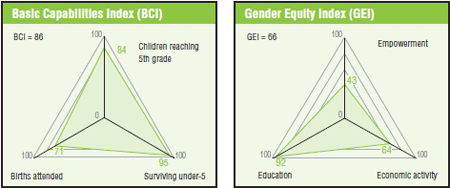Bolivia
Progress and setbacks in the defence of Pachamama
The Government has made an explicit commitment to a coherent policy to combat climate change, but the current development model in the country is built around the extractive sector. The economy and the strategies to overcome poverty are based on oil and gas production and mining. The Government is opting for the carbon credits system and the REDD initiative, but this has raised serious doubts about the development path the Morales administration is taking.
Published on Thu, 2015-06-18 14:45
The first section of the Zero Draft displays a structure that is more coherent and orderly than the introduction to the Open Working Group (OWG) report. The division into 8 subtitles (Introduction, Our Commitment and Shared Principles, Our World Today, Our Vision, The New Agenda, Implementation, Follow-Up and Review, and A Call for Action to Change the World) makes it possible to distinguish the member states’ vision, their level of ambition and, therefore, their political approach more clearly than was the case with the OWG report. This new document is more clearly explicit about the tacit agreements, as well as the points of view about crucial issues such as the development model and the environment, the leading role given to the business sector and the significance that the Agenda carries for member states in terms of commitments and obligations. |
Published on Wed, 2014-10-29 15:20
The employment situation of young people in El Alto is not different from that of young people living in the biggest cities of central parts of Bolivia. High information grade, the increasing presence in the wage-earning sector and in the tertiary sector economic activities, as well as stronger hiring for low qualification jobs that in fact does not lead to the substantial improvement of the quality of juvenile education, are similar features that also characterize the youth labour dynamics in El Alto. Nevertheless, considering high information grade at the labour market of El Alto, the situation of young people demonstrates major signs of employment insecurity translated into high employment instability, low income and social vulnerability. In this context, according to information of the CEDLA, in 2011 only 5 of every 100 employed young people were possessing suitable job positions. |
Published on Wed, 2013-08-21 00:00
For Bolivia – and generally the rest of Latin America—the demands for economic and social inclusion during the 1960s and 70s were associated to the struggle for greater political participation and the transition to democratic government. Therefore, social organizations devoted their energy to fighting dictatorships, considering that political rights and democratic openness would bring as a consequence the much-awaited economic democratization and the improvements in life standards for the whole population. But political participation in democracy through voting (but delegated in terms of representation to the monopoly of the political parties) and progress in respect for individual political rights (recognition to ethnical, gender and other differences) came together with a liberal economic model based on deeply despotic premises. |
|
Published on Fri, 2010-10-29 07:22
The Social Watch International Secretariat together with the Centre for Research on Labour and Agrarian Development (CEDLA) in Bolivia co-organized the Social Watch regional workshop for Latin America that took place from 20 to 22 October 2010 in Santa Cruz de la Sierra, Bolivia. |
|
Published on Tue, 2010-08-31 09:10
This month’s “Focus on…” section highlights the work of Social Watch (SW) Focal Point in Bolivia: the Labour and Agricultural Development Research Centre (CEDLA, in Spanish), which will be hosting the next regional training workshop for Latin America, to be held from 20 to 22 October 2010 in Santa Cruz, Bolivia. |
SUSCRIBE TO OUR NEWSLETTER






